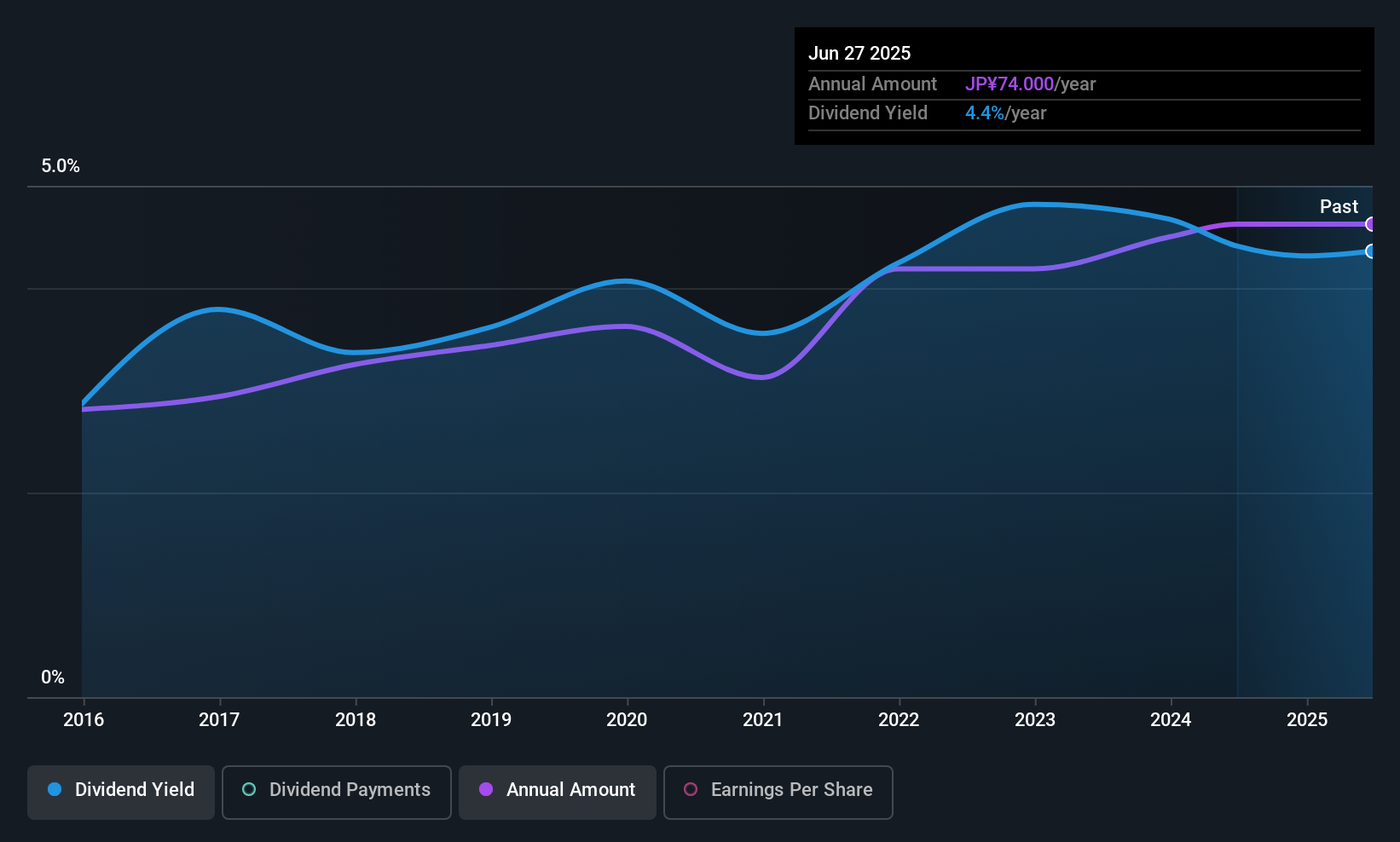- Japan
- /
- Electronic Equipment and Components
- /
- TSE:6870
Fenwal Controls of Japan (TSE:6870) Is Paying Out A Dividend Of ¥37.00
Fenwal Controls of Japan, Ltd. (TSE:6870) will pay a dividend of ¥37.00 on the 31st of March. Based on this payment, the dividend yield on the company's stock will be 4.3%, which is an attractive boost to shareholder returns.
Fenwal Controls of Japan's Projected Earnings Seem Likely To Cover Future Distributions
While it is great to have a strong dividend yield, we should also consider whether the payment is sustainable. Based on the last payment, Fenwal Controls of Japan was paying only paying out a fraction of earnings, but the payment was a massive 638% of cash flows. While the business may be attempting to set a balanced dividend policy, a cash payout ratio this high might expose the dividend to being cut if the business ran into some challenges.
Looking forward, earnings per share could rise by 11.9% over the next year if the trend from the last few years continues. Assuming the dividend continues along recent trends, we think the payout ratio could be 36% by next year, which is in a pretty sustainable range.

Check out our latest analysis for Fenwal Controls of Japan
Fenwal Controls of Japan Has A Solid Track Record
The company has been paying a dividend for a long time, and it has been quite stable which gives us confidence in the future dividend potential. The annual payment during the last 10 years was ¥45.00 in 2015, and the most recent fiscal year payment was ¥74.00. This implies that the company grew its distributions at a yearly rate of about 5.1% over that duration. The dividend has been growing very nicely for a number of years, and has given its shareholders some nice income in their portfolios.
The Dividend Looks Likely To Grow
Some investors will be chomping at the bit to buy some of the company's stock based on its dividend history. It's encouraging to see that Fenwal Controls of Japan has been growing its earnings per share at 12% a year over the past five years. With a decent amount of growth and a low payout ratio, we think this bodes well for Fenwal Controls of Japan's prospects of growing its dividend payments in the future.
In Summary
Overall, it's nice to see a consistent dividend payment, but we think that longer term, the current level of payment might be unsustainable. While Fenwal Controls of Japan is earning enough to cover the payments, the cash flows are lacking. This company is not in the top tier of income providing stocks.
It's important to note that companies having a consistent dividend policy will generate greater investor confidence than those having an erratic one. Still, investors need to consider a host of other factors, apart from dividend payments, when analysing a company. As an example, we've identified 3 warning signs for Fenwal Controls of Japan that you should be aware of before investing. If you are a dividend investor, you might also want to look at our curated list of high yield dividend stocks.
New: AI Stock Screener & Alerts
Our new AI Stock Screener scans the market every day to uncover opportunities.
• Dividend Powerhouses (3%+ Yield)
• Undervalued Small Caps with Insider Buying
• High growth Tech and AI Companies
Or build your own from over 50 metrics.
Have feedback on this article? Concerned about the content? Get in touch with us directly. Alternatively, email editorial-team (at) simplywallst.com.
This article by Simply Wall St is general in nature. We provide commentary based on historical data and analyst forecasts only using an unbiased methodology and our articles are not intended to be financial advice. It does not constitute a recommendation to buy or sell any stock, and does not take account of your objectives, or your financial situation. We aim to bring you long-term focused analysis driven by fundamental data. Note that our analysis may not factor in the latest price-sensitive company announcements or qualitative material. Simply Wall St has no position in any stocks mentioned.
About TSE:6870
Fenwal Controls of Japan
Designs, develops, manufactures, and sells fire prevention and extinguishing, temperature control, and medical equipment in Japan, rest of Asia, and internationally.
Excellent balance sheet established dividend payer.
Market Insights
Community Narratives



